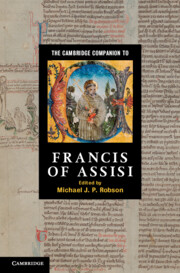Book contents
- Frontmatter
- Introduction
- PART I Francis of Assisi
- 1 Francis and the Franciscan movement (1181/2–1226)
- 2 The writings of Francis
- 3 The Rule and life of the Friars Minor
- 4 Francis and his hagiographical tradition
- 5 Voluntary simplicity: the attitude of Francis towards learning in the early biographies
- 6 Francis and the historiographical tradition in the order
- 7 Francis and Clare and the emergence of the Second Order
- 8 Francis and the encounter with the sultan (1219)
- 9 Francis and creation
- PART II The heritage of Francis of Assisi
- Index
6 - Francis and the historiographical tradition in the order
from PART I - Francis of Assisi
Published online by Cambridge University Press: 28 November 2011
- Frontmatter
- Introduction
- PART I Francis of Assisi
- 1 Francis and the Franciscan movement (1181/2–1226)
- 2 The writings of Francis
- 3 The Rule and life of the Friars Minor
- 4 Francis and his hagiographical tradition
- 5 Voluntary simplicity: the attitude of Francis towards learning in the early biographies
- 6 Francis and the historiographical tradition in the order
- 7 Francis and Clare and the emergence of the Second Order
- 8 Francis and the encounter with the sultan (1219)
- 9 Francis and creation
- PART II The heritage of Francis of Assisi
- Index
Summary
Some people have the misfortune to be remembered primarily through the writings of their critics. Others, such as Francis, who are mainly remembered in the writings of their admirers, are not necessarily better off. Uncritical adulation and hero worship can be worse than honest criticism. In this sense hagiography has long had a poor reputation among historians. They have never trusted the hagiographer (and still do not) and have rebuked him for being biased and uncritical, preoccupied with miracles and supernatural powers. Whereas the supposedly impartial historian is interested in reality and hard facts, the hagiographer simply tells us stories. However, in the foregoing chapters we have seen that Franciscan hagiography presents us with a surprisingly human saint: in fact, we find a remarkable concentration on the saint's humanity, on his needs, on his body, on his afflictions, his sufferings and weaknesses.
It is also clear that for thirteenth-century writers the difference between hagiography and history was far less significant than for scholars trained in the academic traditions developed in the nineteenth century. Finally, the modern historian's preoccupation with ‘real facts’ rather than ‘stories’ has been rudely shaken by the discovery that historical science, even in its most methodological, quantifying and analytical aspects, cannot exist independently of narrative constructions. In other words, history (whether an art or a science) is, and always will be, bound up with story-telling.
- Type
- Chapter
- Information
- The Cambridge Companion to Francis of Assisi , pp. 101 - 114Publisher: Cambridge University PressPrint publication year: 2011



